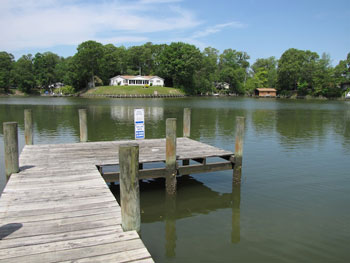
A new Longwood program, set to begin fall 2013, will prepare students for careers in the fast-growing field of environmental sciences.
The new integrated environmental sciences degree has been approved by the State Council for Higher Education in Virginia, the commonwealth’s coordinating body for higher education. The degree program, which is expected to enroll approximately 20 students each year, is a response to a call from the state government for new opportunities for students to pursue science, technology, engineering and mathematics (STEM) careers. In its report "Preparing the Top Jobs of the 21st Century," a state commission on higher education said, "Virginia will need to prepare 100,000 additional workers with STEM degrees over the next decade."
"This is an innovative program that is much needed for Virginia," said Dr. Mark Fink, chair of the Department of Biological and Environmental Sciences. "This field is going to see significant job growth over the next 10 years, and Longwood is going to be a leader in creating the environmental scientists of the future."
"This program will expand the STEM course work at Longwood and prepare our students for careers in an important and growing field," said Dr. Charles Ross, dean of the Cook-Cole College of Arts and Sciences. "It’s a perfect fit for Longwood and has already received considerable interest. I foresee top-notch work coming out of this program."
The program’s uniqueness comes from its interdisciplinary approach to environmental sciences, which will include needed skill sets as well as practical hands-on experiences throughout the entire curriculum. Students have the options of exploring environmental science through the lens of economics, sociology, health and recreation, chemistry and physics—providing not only a broader knowledge base but also opening the door to more career paths. In addition to providing students with a solid foundation in the sciences, student knowledge will be deepened through specialized upper-level coursework: capstone courses focusing on environmental planning, management and decision making.
Environmental science graduates will be uniquely prepared for careers in a wide variety of fields, including public health, public resource management, green technology, nongovernmental organizations and state and federal agencies. "This degree program is not only interdisciplinary, it’s truly integrated," said Fink. "The intentional integration and application of content, context and skills will enable our students to help solve complex real-world issues and be real leaders in this growing field."
The program is designed for students with a wide range of interests. Four concentrations: life sciences, physical sciences, earth sciences and social sciences will be offered, including the option to create your own concentration. Representatives of several key state environmental agencies and non-profit groups, including the Chesapeake Bay Foundation Department of Environmental Quality, Department of Conservation and Recreation and Clean Virginia Waterways support the program.

